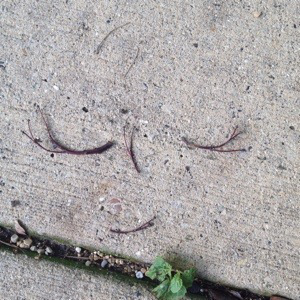The Best American Science and Nature Writing 2009

Bashful sidewalk
For the last two weeks I have been slogging my way through The Best American Science and Nature Writing 2009, edited by Elizabeth Kolbert. It’s not as long as it took me to get through it, but I kept getting distracted by reading gay short stories. Unfathomable, I know.
Anyway, I’ve read I think two other Best S&N collections before, and they aren’t messing around with that ‘best’ claim, although there’s usually one or two essays (articles? entries? stories?) that I don’t care for as much–this time it was one about the contagious cancer in the Tasmanian Devils, which is awful, but I’ve heard about it extensively from other sources already, and also the writing was dry.
I was worried the science would be out of date, but it was mostly still relevant, 5 years later, so that was encouraging. The LHC hadn’t been activated yet, though, and that was commented on in several of the articles–and in at least one it would have affected the content, after.
I love science. But it’s such a horrible cliche to say that now. So I can say that I loved science before it was cool, but that’s another cliche and a half. Plus there’s all this kick-back about how loving the information science provides us with is not loving the actual science–but I do love the actual science, and the scientists who do it, and I wish that I had chosen a more scientific path in life, so that I could be one of them.
But the real problem that I have with the whole ‘I science’ movement, is that it all but turns science into a religion–or into magical thinking, rather. “Science shows us…” “According to Science…” “That’s Science.” Science isn’t just one thing, and it’s not a magical answer-all tool. It’s made up of people, who do things and study things and analyze things, and each of those people has a different name. And each of the things that they study has a different name.
And each of those conclusions that you so much cannot be fully appreciated scientifically unless you also know where it came from, how we discovered it, and why it happens that way–to the best of our knowledge. Simple facts are not science, and they are not teaching people to like science, they are just tiny chunks of digestible information which teach people to believe everything they hear.
Facts without a history are as likely to be fiction as truth.





